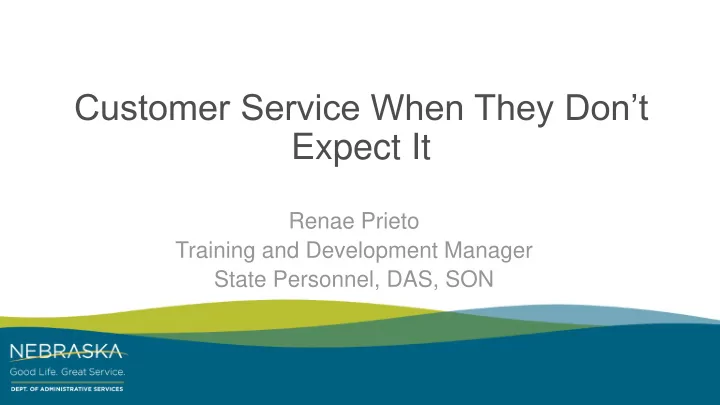

Customer Service When They Don’t Expect It Renae Prieto Training and Development Manager State Personnel, DAS, SON
As A Customer… Please share the best customer experience you’ve had.
As A Customer… Please share the worst customer experience you’ve had.
Who are your customers?
In the public sector, it might not be so clear…
The public’s expectations…
How do we offer more than meatloaf? 1. Manage personal interactions 2. Improve the process 3. Focus on outcomes
Manage personal interactions Don’t be a jerk.
Empathy - The degree of caring and individual attention we show customers.
Manage personal interactions There is no “magic bullet”. Truly exceptional customer service is offering each customer an individualized positive experience.
What AND How What do they need? They’ll tell you! How do they need it? You’ll have to infer it. Body language, rate of speech, etc.
Mirror your customers! • The customer in a hurry • The customer who needs to really understand • Other examples?
Simple Dos • Smile! • Be friendly • Be patient • Be helpful
Simple Don’ts • Rush • Sigh • Act annoyed or impatient • Try to improve the customer’s behavior
Angry or Rude or Frustrating People
When Customers are Difficult Know that anger is frustration blamed on you. It is not personal, and you will be incapable of delivering exceptional customer service is you take it as such. Great customer service gets rude people on their way faster! Be empathetic to angry/rude people; you don’t know their story or situation….
Mirror the opposite Customer is… You should be… Upset Calm & kind Needy Accommodating Arrogant & Know-it- Grateful for the all information Do not allow customers to be abusive!
Leigh Thompson, professor of dispute resolution at Northwestern University’s Kellogg School of Management, says you’ll have a better chance with angry customers if you: • Let them vent. • Apologize if you’re wrong or made a mistake. • Focus on the issues, not the personality of the customer.
On the Phone • Smile! (yes, they can tell) • Answer with name and department • Ask how you can help them • Speak slowly and intelligibly • Use plain language; avoid jargon • Repeat information given
On the Phone • Thank the caller • Sound natural and conversational, not robotic or like you’re reading a script. • Ask permission to put on hold, and give realistic wait time. • Respond to voicemails within 24 hours. • Empathize! Kindness goes a long way…
Email Etiquette • Think business letter; err on the side of formal • Always use a salutation and a friendly close • State the purpose of the email, even if it is a response • Give contact information for questions, etc • Always use proper grammar, punctuation, usage and other conventions.
Email Etiquette • Capitalize properly; you are not e.e. cummings. • DON’T SHOUT!!!!!! • Respond to emails within 24 hours. If it will be longer, give a realistic time an answer can be expected. • Always set out of office replies.
Improve the Process Most attention is given to the personal interaction when training for customer service. However, the customer experience has a much farther reach than just that.
Customer Expectations are Changing!
We must design our systems from the customer experience perspective, and not from our operational perspective.
Improve the Process We must design our systems from the customer experience perspective, and not from our operational perspective. For example, automated phone systems save money and are operationally sound. But how does the customer experience this? http://youtu.be/X6i_E1G45zY
Two of the major things that people want are simplicity and a predictable interface . Establish your points of contact: • Website? • Phone call? • Walk in? • Letter?
Examine and Improve Website • Searchable? • Easy access to information? • Contact information easily accessible? • Can complete transactions online? • If this is tight, more customers will be self-care. This is the format most now expect. • Have you explored sites from other Universities?
Examine and Improve Phone • Who answers the phone? • What happens when lines are busy? • What is the hold message? • How many transfers are necessary? • Do you audit phone calls? • How do you collect feedback?
Examine and Improve In person • Is your office easy to find? Parking? • Are all visible employees helping customers? • Comfortable waiting area? • Handouts with more information? Or directions for completing the task online? • How do you collect feedback?
Focus on Outcomes Everything about which we’ve talked should be geared to one goal: allowing customers to complete their goal. Make it easy!
Focus on Outcomes Anticipate where they might have trouble and proactively act.
Delivering exceptional customer service begins simply by each individual deciding every day to do so. “If we do not lay out ourselves in the service of mankind whom should we serve ?” John Adams
Thank you! University employees may take courses we offer. Take a business card or take a picture of the next slide and send me an email if you’d like to be on our mailing list for upcoming classes. (It’s just a couple a month.)
Renae Prieto renae.prieto@nebraska.gov 402-350-7596
On Your Own… What actions will you take tomorrow to move toward exceptional customer service? 2-3 actionable items for discussion
Recommend
More recommend